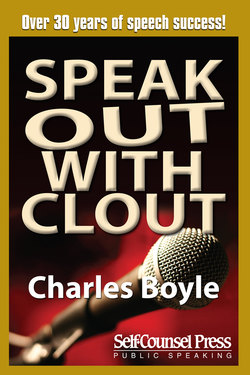Читать книгу Speak Out With Clout - Charles Boyle - Страница 5
На сайте Литреса книга снята с продажи.
Who Will Listen?
ОглавлениеDr. Edward R. Annis, a former president of the American Medical Association, began a speech some years ago by saying: “When you talk about some of the crowds I have spoken to, it reminds me of a lady who called me and said, ‘Dr. Annis, now that you have made the big time on television and all that, how many people do you have to have before you make a speech?’ I said, ‘Well, I still insist on two — but I will be one of them.’ I will talk to anybody who will listen, because I think it is important.”
Before quitting the news business and getting into speeches, it occurred to me that it might help to know if there was a market for my services. Being unable to afford a market research expert, I took my own survey in about 20 minutes. The formula was easy. Knowing there were 20 Rotary Clubs in the immediate vicinity of my city in the 1970s and that Rotary Clubs meet every week, simple arithmetic added up to about 1,000 speeches a year being given at Rotary Clubs alone. Armed with that knowledge, my guess was at least 4,000 or 5,000 speeches were being given each year in any metropolitan area. I was wrong. There were 1,000 or 2,000 speeches being given every day in my metropolitan area. In metropolitan New York in the 1970s, an estimated 10,000 speeches were being delivered every day.
Service clubs are not the only groups looking for programs. There are also Parent-Teacher Associations (PTAs), retiree clubs, garden clubs, conventions, school assemblies, and scores of other organizations ranging from monthly labor union luncheons to weekly “establishment” meetings. The audiences for speeches are there — always have been there and always will be there.
The question, then, is not who will listen — everybody listens to speeches — but rather, who will listen to you give a speech?
The answer is that almost everyone has something interesting to say regardless of their profession. The doctor, lawyer, engineer, and company president — all are experts in their field as far as everybody who is not in their field is concerned. But even the nonprofessional has something of interest to speak about. A used-car salesperson undoubtedly has some amusing and fascinating stories to tell about his or her business as well as some useful, practical advice to share with all of us who buy a car. Or as an avocation the speaker might be a general in the National Guard or a member of the Propeller Club. Maybe he or she is an expert scuba diver or parachutist.
Everybody has a little more knowledge in a particular field than the rest of us, and there’s an audience out there waiting to hear about it. But whether a person is a used-car salesman or the president of the biggest bank in town, an audience expects and deserves more than a mental grasping for words and information from the speaker. If a company executive is invited to speak to 500 people at a convention, he or she would be a fool to start thinking about what to say to them while en route to the site and then jotting down a few notes while munching on salad prior to the speech. The speaker would be smart to go to that convention well-prepared.
Mark Twain said it takes about three weeks to prepare a good, impromptu speech. And yet, the businessperson, invited to a small club with an audience numbering 20 or 25 people, might slough off its importance and do to them what he or she wouldn’t do to a large audience — think about what to say on the way out of his or her office an hour before the speech. Such a lack of preparation too often results in a disgruntled audience, a dissatisfied speaker, and a lost opportunity to present an effective message for a cause or a company.
You have no reason to lose those opportunities — people will listen to you if they are not put under a strain brought on by your unpreparedness and fumbling. They will listen if they hear new information, something they haven’t heard before: a message.
